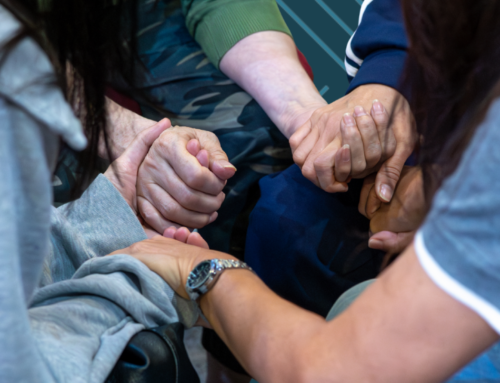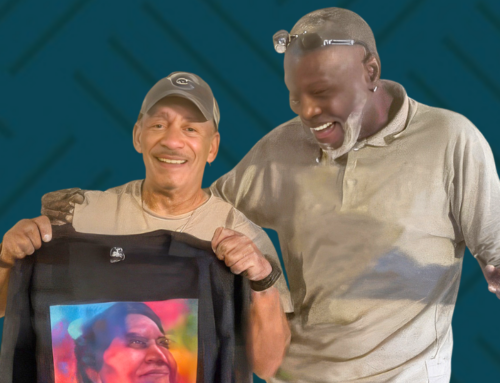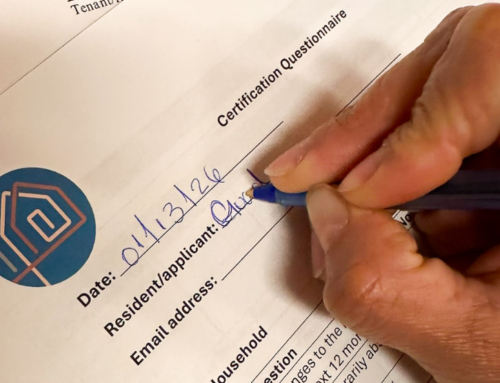By Miriam Medina, Director of Formation
“Close your eyes and picture the scene,” I said each weekend morning in the courtyard chapel at Joshua Station as we dove into scripture. “What’s around you? What do you see, what do you smell? Who is speaking? Who is being overlooked?”
This kind of imaginative reading was how we began most sessions of our women’s Bible study. Not with a lecture, but with a question. Not from the center, but from the margins. Because when you are reading scripture in a room filled with women who are surviving homelessness, poverty, violence, betrayal and more, the Bible does not show up as a book of distant and abstract theology. Rather, it shows up as life. It shows up as something real, raw, and deeply personal.
It also shows up by invitation, not coercion. At Mile High Ministries’ we openly welcome residents to explore and grow in their faith own experience, so it is never mandated.
Over the course of five weeks, a group of Joshua Station residents gathered with my colleague Mary Ann and me in our small courtyard chapel. Each weekend morning, we were welcomed not by stained glass or polished pews, but by a wide-open door, soft morning light, the scent of coffee brewing, and spring flowers just outside. This wasn’t the kind of church many of us had grown up with. There were no pulpits, no stage lights, no formal rows. Instead, our group of comadres sat in old wooden chairs arranged in a circle, surrounded by the warm scent of incense, the hum of daily life just beyond the walls, and the quiet intimacy of a space that felt sacred simply because we made it so.
We centered women’s stories in scripture, especially those often overlooked or misunderstood. As we read each passage, we didn’t simply observe the stories, we entered them. We reflected on Hagar, who was seen by God in the wilderness. We explored the courage of the woman with chronic bleeding, who reached for healing with fierce hope. We honored Mary Magdalene, the first to preach the good news of the resurrection. We even reimagined Proverbs 31 not as a checklist of impossible perfection, but as an anthem of survival and resilience—proof of women’s sacred strength. These stories became mirrors, offering our residents a glimpse of themselves in the text.
The women shared their own faith journeys, marked often by deep pains. Alcoholic parents… spousal abuse… addictions. Among the women, the stories cracked open something new. What unfolded in that small chapel went beyond study. It became a space of deep comradery and solidarity. We all came as we were, with coffee in hand and stories in our hearts. We listened to one another with tenderness. We laughed together, cried without shame, and offered comfort when voices broke mid-sentence. We shared a sense of mutual care that didn’t need to be taught; it was embodied.
This was not an effort to “bring God” to our residents. God was already there, stitched into their stories long before we ever gathered. What we did was name it, claim it, and celebrate it! Every single story I heard was already drenched in God’s presence.
The women were not newcomers to faith, but this space gave them permission to read the Bible differently, with their voices and experiences at the forefront. They were invited to bring their trauma, their mothering, their doubt, their humor, and their joy into the room. We didn’t stick to a script. I came with a lesson plan, but Spirit often led us elsewhere.
Conversations wandered into personal memory, cultural tension, questions about power, forgiveness, and loss. And somehow, the holy emerged right there in the detours. One Saturday, one of the women arrived in her Sunday best—a beautiful long skirt and bright red lipstick. “You don’t know how much I’ve been looking forward to this all week,” she said. That moment moved me deeply, not because of what we were teaching, but because of what we were creating together. She was seen. She was heard.
Our conversations weren’t always tidy. Interpersonal conflict, frustration, and trauma surfaced. But those moments became invitations too. They became opportunities to remember that every person in the room was more than our worst moment, more than a missed community chore at Joshua Station or the struggle to make rent. We got to see each other and be seen. We practiced vulnerability across the board—residents and staff alike.
As I reflect on the last five weeks, I realize that this wasn’t just Bible study. It was an act of resistance. In a world that too often silences women, especially those navigating poverty and trauma, we gathered around sacred stories that told us: You are powerful. You are chosen. You are worthy of God. Together, we declared, we have the power to be ourselves and permission to center our stories. And that, to me, is theology in action: a faith that rises from the margins, that lifts up the voices of women in all their beauty and complexity, and that insists the gospel is good news because it belongs to us too.
We’ll be back in that chapel soon. The women are already asking when, and I believe that God will be waiting for us there.







